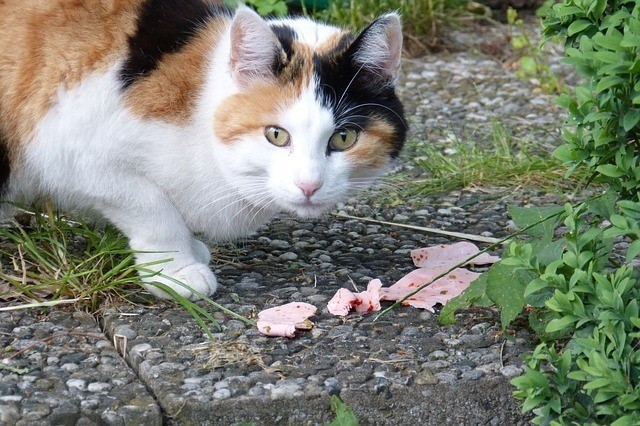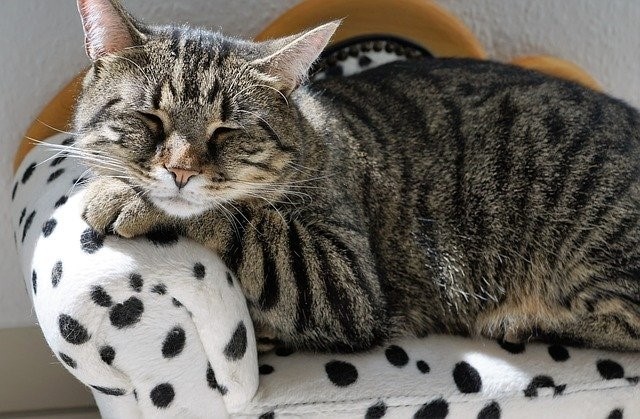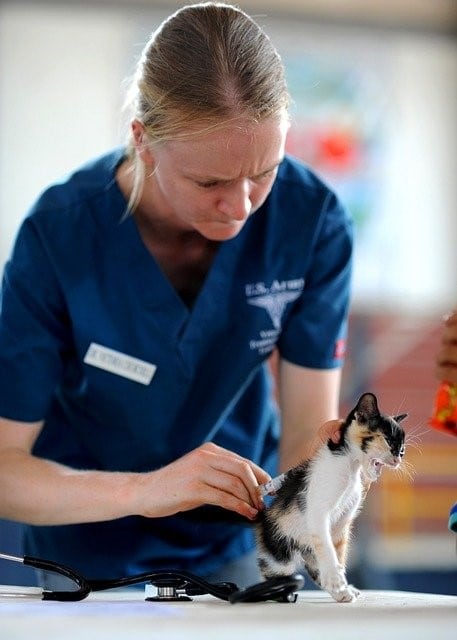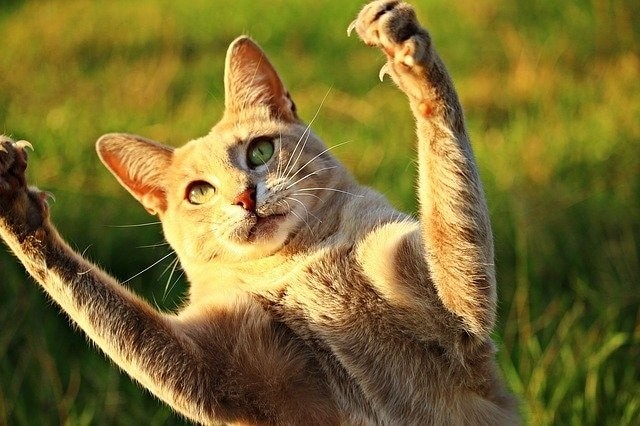Some people are dog people, while others are cat people. Either way, our companions need to be healthy and well-looked-after if they’re going to keep us company for longer. While cats in general tend to live longer than dogs, it is possible to make your cat live longer still. Your cat’s environment, diet, aging, breed, and other factors play a critical role in her health and well-being.
Exotic pets have exotic needs, specific to their breed or country. Unless you’ve done your homework, owning an exotic pet may leave you feeling very poor at the end of the month. This could play a crucial role in why so many American households mostly own dogs or cats.

Figure 1: Number of U.S. Households that Own a Pet (millions)
© ourpetsite.com, 2020 Adapted from statistics taken from the 2019-2020 APPA National Pet Owners Survey.
But owning a dog or a cat is not necessarily less expensive or takes up less time. We also tend to give dogs and cats human qualities and habits, and they’re seen more as part of the family than a rodent or exotic animal is.
So many people worldwide own dogs and cats. There’s a ton of info to be found online that’ll tell you how best to care for them. The tricky part is figuring out which of that advice is worth following.
“Dogs have masters. Cats have employees.” ~ Anonymous
While it’s not clear who first said that dogs have masters and cats have employees, research suggests that dog owners are willing to pay more for their fur babies’ needs and medical costs than cat owners are. Reasons for this include the sense of ownership, companionship, and control (through dog obedience) a dog owner feels. Apparently, this is because cats just hang around waiting for food from an employee, ignore said employee, and sleep all day!
Be that as it may, some cats can be finicky about the food they eat and where they go potty or sleep. In contrast to the popular thinking that cats have employees, studies show that cats do respond to their humans. Cats pick up on our auras and moods, and respond to us the way we respond to them.
10 Ways To Make Your Cat Live Longer
Whilst these top tips can help you give your cat an optimal life-play balance, it’s always best to consult with your vet before trying something new, and by doing a little research on how best to manage your cat’s needs. For instance, Sphynx cats should generally stay out of the sun as they tend to get sunburned.
1. Making friends with your cat
Although not everyone is convinced that cats need to bond with their caregivers, the level of bonding you introduce is likely to remain constant as your cat grows older. Being able to bond with your cat or kitten is vital, as you need to be close to her for grooming and companionship.
2. Taking care of your cat
Grooming plays a large part in a cat’s life. The constant cleaning of her coat could leave her with a tummy full of hairballs that may cause a loss of appetite, inability to go potty, and a blocked airway. If home remedies for hairballs don’t seem to work for your cat’s skin and coat care, speak to your vet about a specialized product that can help, or invest in grooming products such as hair removal mitts or a brush.
And always provide clean drinking water for your cat at all times.

3. Feeding your cat
Often, you may find your cat has lost her appetite or developed strange eating habits. There could be a number of reasons for this, including age, change in diet, underlying conditions, or that she simply caught a mouse 10 minutes ago! No matter what, weight control and a healthy diet are integral to your cat’s wellness.
Some breeds prefer dry cat food such as pellets, and dry cat treats like biscuits. Others may enjoy wet cat food more. Wet cat food includes meaty treats and tinned fish, pate, or meat-like tinned food. Whatever food you choose to feed her, make sure it’s based on a high-quality, vet-approved diet. Check with your vet before changing her diet because a change in diet means a change in potty habits.
4. Enhancing your cat’s diet
Veterinary diets, cat supplements, and cat vitamins are essential to your cat’s healthcare program. Prebiotics and probiotics also play an essential role in your cat’s digestive care. As cats are carnivores, giving your cat small, meaty or fishy treats in her everyday diet also provides added protein and good fatty acids such as Omega 3 and Omega 6. Fatty acids help to absorb vitamins and regulate your cat’s body temperature.
5. Cleaning up behind your cat
The smell of a dirty cat litter box is awful, and even more so for your cat at ground level. Cleaning up the litter box needn’t be a disgusting experience. Use this time to check if your cat is regular, has any discharge or blood in her feces, is generally in pain when going potty, or if she may have worms.
6. Controlling pests in your cat
Ticks, fleas, mites, flies, mosquitoes, and worms are amongst the most common pests that will make your cat unhappy, and add to a lack of appetite or medical conditions. There are many ways to treat and manage pests, including specialized products, a change of environment, and keeping your cat’s vaccinations up to date.

7. Managing health issues in your cat
As your cat ages, you may see signs of her health weakening. These signs could include hip and joint stiffness, urinary conditions (such as a weakened bladder), eyesight problems, or hearing problems. Some psychological issues relating to stress, confusion or general anxiety could add to her woes.
Maintaining ear care, eye care, urinary care, and joint or hip care is vital to keeping your cat healthy and happy. Dental care is critical in ensuring that your cat eats her food, and enjoys mealtimes. Consult your vet if you have any concerns about your cat’s overall health.
8. Preventing diseases in your cat
Keeping your cat’s vaccinations up to date – and a record of those vaccinations – will help you make sure that you never miss another vaccination again. Some of the diseases that vaccinating can prevent include rabies, feline distemper, leukemia, and panleukopenia (a form of feline parvovirus).

9. Spaying or neutering your cat
Not only does spaying and neutering prevent uterine infections, it also helps curb certain cancers and malignant tumors in almost 90% of cats, and about 50% in dogs. Studies consistently show that spaying or neutering your pet has great health benefits for both humans and pets.
10. Entertaining your cat
Cats are – for the most part – playful creatures who love to chase balls, mice, and strings. Toys and climbing structures are a wonderful source of endless entertainment for your cat. Spend quality time playing with your cat to enhance your companionship, friendship, and love.

You may also like
10 Ways To Make Your Cat Live Longer
Some people are dog people, while others are cat people. Either way, our companions need...
Read MoreMy pet and COVID-19
The Coronavirus (COVID-19) pandemic has caused world-widehavoc in all the countries where it is now...
Read More

